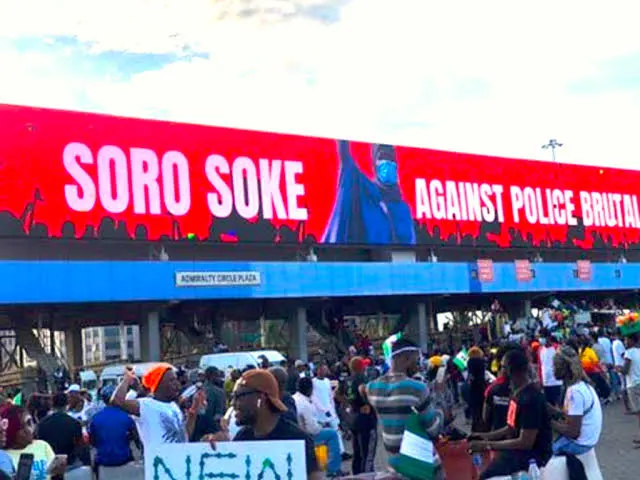Breaking: ECOWAS Court Finds Nigeria Guilty of Rights Abuse at Lekki Tollgate
The Nigerian government abused the rights of #EndSARS protesters at the Lekki tollgate in October 2020, the Economic Community of West African States (ECOWAS) Community Court of Justice has ruled.
In a landmark verdict delivered on Wednesday by Justice Koroma Mohamed Sengu, the Judge Rapporteur, the court flayed the government’s particularly “disproportionate use of force” in response to the #EndSARS protest at the tollgate in Lagos on October 20, 2020.
The court also found that live rounds were shot into the crowd of unarmed protesters.
It mandated the Nigerian government to pay a total of N2 million in compensation to each victim named in the suit.
Brought before the ECOWAS Court by a coalition of human rights activists and organisations, the case alleged severe violations of fundamental human rights by Nigerian security forces.
Amnesty International also submitted an Amicus Brief, which was declared admissible by the court. After thoroughly examining evidence and testimonies, the court concluded that the Nigerian government’s actions breached several international human rights standards, including Articles 1, 5, 6, 9, 10, and 11 of the African Charter on Human and Peoples’ Rights.
Among many other key findings, the court found credible evidence of disproportionate use of force and violations of the right to liberty and security, assembly, free speech, and dignity. It stated that the use of force was not necessary and contravened the Respondent State’s obligations under the African Charter.
The court also agreed that the applicants had suffered torture at the hands of the Nigerian government. It added that the situation at the Lekki tollgate, where live rounds were shot into the crowd of unarmed protesters, created a situation of fear, and the Nigerian government did not present evidence refuting those allegations.
The court further held that the government failed to allow and afford the applicants their rights to freedom of expression, assembly, and association, therefore violating the applicants’ rights under Articles 9, 10 and 11 of the African Charter.
The government’s actions were deemed inconsistent with Nigeria’s obligations under the ECOWAS Revised Treaty and the African Charter on Human and Peoples’ Rights.
The court held that the quasi-mechanism set up by the government to investigate the allegations of abuse at the Lekki toll gate lacked independence and was questionable.
It therefore ordered the Federal Government of Nigeria to pay N2 million each in compensation to the applicants.
It also mandated the Nigerian government to conduct investigations into the human rights abuses, with a view to implementing the outcomes of said investigations.
The government was also ordered to report to the court in six months with an update on the compensation and progress of the inquiry.
Reacting to the judgment, Bolaji Gabari, lead counsel for the applicants, described the ruling as a significant victory for the #EndSARS movement, an acknowledgement that citizens’ rights were violated and that abuses occurred at Lekki tollgate.
“We urge the Nigerian government to comply fully with the court’s orders and take immediate steps to address the systemic issues identified in the judgment,” Gabari said.
Mojirayo Ogunlana, one of the counsel to the applicants, said recalled that the Nigerian Government failed to show up to put in a defence until 2023, when, in its address, it claimed, amongst others, that the EndSARS peaceful protest was unlawful and perpetuated by hoodlums.
“The landmark ruling by the ECOWAS Court in favour of EndSARS victims is a powerful affirmation of justice and a significant step towards healing and accountability for the Lekki Tollgate tragedy,” added Nelson Olanipekun, Executive Director at Gavel, coordinating organisation for the coalition.
Also Read: Mali, Niger and Burkina Faso to form New Confederation after leaving ECOWAS
On 20 October 2020, peaceful and unarmed protesters were fired at by Nigerian security agents at the Lekki tollgate, bringing the landmark #ENDSARS protests to a violent end.
The protest had begun organically in Delta State 17 days earlier, expanding to other parts of the country with calls for justice against police brutality in Nigeria.
In December 2021, three victims brought a case before the ECOWAS Court, Obianuju Catherine & 2 Others v. Federal Republic of Nigeria (ECW/CCJ/APP/72/2021), to seek justice for themselves and those impacted by the violations.













